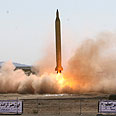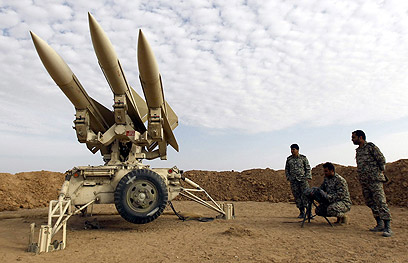
'Iran no longer on track to achieving long-range missile'
New US Congress report doubts Tehran will be able to obtain long-range ballistic missiles by 2015; US extends waivers on Iran sanctions to India, China
An internal report for the US Congress has concluded that Iran probably is no longer on track, if it ever was, to having an ocean-crossing missile as soon as 2015.
The study casts doubt on a view long held by US intelligence agencies that Iran could be able to test-fly by 2015 an intercontinental ballistic missile, or ICBM, if it receives "sufficient foreign assistance."
Related stories:
- Iran unveils new missile systems 'Iran supplied Hamas with missile technology' Op-Ed: The Iranian bluff
"It is increasingly uncertain whether Iran will be able to achieve an ICBM capability by 2015," said the report by the non-partisan Congressional Research Service, which works exclusively for lawmakers.
Iran does not appear to be receiving as much help as would likely be necessary, notably from China or Russia, to reach that goal, according to the 66-page report dated Thursday.
It is also increasingly tough for Tehran to obtain certain critical components and materials because of international sanctions related to its disputed nuclear program.

Iranian missile test (Archives: AFP)
In addition, Iran has not demonstrated the kind of flight test program generally deemed necessary to produce an ICBM, said the study by Steven Hildreth, a specialist in missile defense who consulted seven external expert reviewers.
Iranian threats void?
The study appears to be the most detailed unclassified look yet at Iran's controversial ballistic missile and space programs. It does not address Tehran's nuclear program, which has prompted international fears that it could lead to atomic weapons at short notice.
An effective nuclear-weapons capability requires three things to work together - enough fissile material, a reliable weapons device and an effective delivery system, such as a ballistic missile that can grow out of a space launch program.
Iran's efforts to develop, test and field ballistic missiles and build a space launch capability have helped drive billions of dollars of US ballistic missile defense spending, further destabilized the Middle East and contributed to Israel's push for preemptive action.
'Views on Iran vary'
The US intelligence community since 1999 has stuck to the conditional 2015 date, provided Iran gets enough outside help, for a potential Iranian ICBM capable of reaching the United States, which is at least 10,000 kilometers away.
"With sufficient foreign assistance, Iran may be technically capable of flight-testing an intercontinental ballistic missile by 2015," the Defense Department told Congress in its 2012 annual report on Iranian military power.
Michael Birmingham, a spokesman for the office of the Director of National Intelligence, said views among spy agencies vary on the Iranian ICBM outlook.
He added that the 2015 date cited by the Defense Department was "heavily caveated."

Show of force. Iranian military parade (Photo: Reuters)
Tom Collina, research director of the private Arms Control Association, a Washington-based advocacy group, said the report suggests the United States could respond in a more "measured" way to a potential Iranian long-range missile threat.
"We do not have to deploy missile defenses on the East Coast by 2015, as some in Congress want, nor do we have to rush missile defenses into Europe, which makes Russia nervous," he said.
India, China get sanctions waiver
Meanwhile, the United States has granted 180-day waivers on Iran sanctions to China, India and a number of other countries on Friday in exchange for their cutting purchases of oil from the Islamic Republic.
President Barack Obama's administration has now renewed waivers for all 20 of Iran's major oil buyers, after granting them to Japan and 10 European Union countries in September.
Friday's action was the second renewal for all 20 after Obama signed the sanctions into law a year ago.
The sanctions aim to choke funding to Iran's nuclear program, which the West suspects is enriching uranium to levels that could be used in weapons. Tehran says the program is for civilian purposes.
"The United States and the international community remain committed to maintaining pressure on the Iranian regime until it fully addresses concerns about its nuclear program," secretary of state Hillary Clinton said in a statement.
Clinton also granted waivers, known as "exceptions," on Friday to South Korea, South Africa, Turkey, Sri Lanka, Malaysia, Singapore and Taiwan.
Under the sanctions law, banks in countries that buy oil from Iran can be cut off from the US financial system unless their purchases decline.
Iran's oil exports have fallen 50% in 2012 in the face of US sanctions and a EU embargo that began on July 1.
That has cost Iran up to $5 billion a month and led to a plunge in Iran's currency, the rial, David Cohen, undersecretary for terrorism and financial intelligence at the US Treasury Department said this week.
Critics of the US sanctions say they will not rein in Iran's nuclear program unless they are accompanied by adequate diplomacy.
- Receive Ynetnews updates directly to your desktop










